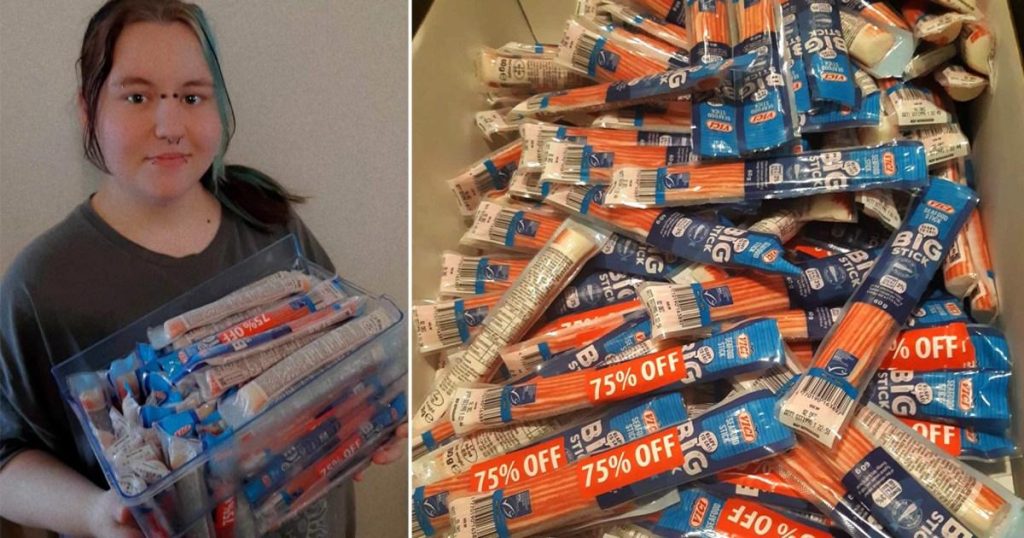Piper Rodgers, a resident of Sheffield, England, and a frequent user of the “Too Good To Go” app, experienced an unexpected seafood bonanza. This app connects consumers with businesses like restaurants and supermarkets that have surplus food nearing its expiration date, allowing customers to purchase these items at significantly reduced prices, thereby minimizing food waste. Hoping to snag a few bargains, Piper ordered a discounted box from Aldi for £3.30. Little did she know, her bargain would come in the form of a massive quantity of seafood sticks, far exceeding her expectations.
Upon arriving at the designated Aldi store to collect her order, Piper inquired about her Too Good To Go box with the cashier. The cashier summoned an employee who emerged carrying a surprisingly large box. As the employee approached, he repeatedly apologized, which initially puzzled Piper. The mystery was soon revealed as the employee explained the box contained “just our big sticks.” Piper, to her amusement, discovered the box was overflowing with Aldi’s “Big Sticks” brand of seafood sticks – a whopping 106 of them. While the employee seemed apologetic, Piper, a seafood enthusiast, was delighted with her unexpected bounty. The sheer volume of seafood sticks was worth £51.94, making her £3.30 purchase an incredible deal.
The abundance of seafood sticks presented both a logistical and culinary challenge. Piper’s partner, not a fan of seafood, was taken aback by the sheer quantity. Besides the mountain of seafood sticks, the Too Good To Go box also contained two boxes of eclairs, a bag of salad, and a bag of mint. Piper, seven months pregnant and craving seafood dip, saw the situation as a fortunate opportunity. With a freezer drawer overflowing with seafood sticks, she embarked on a quest to find creative ways to utilize them before her baby arrives in February.
Piper’s online post about her seafood stick windfall garnered a plethora of recipe suggestions from friends and family, including noodle dishes and seafood corn chowder. While her freezer now resembles a seafood stick repository, Piper remains enthusiastic about the Too Good To Go program. She considers her £3.30 purchase an excellent value, emphasizing the element of surprise inherent in these discounted boxes. Even if she hadn’t been a seafood lover, she would have found the situation humorous, demonstrating her ability to find the comedic side of unexpected events.
This story highlights the benefits of the Too Good To Go app, not only for budget-conscious consumers but also for businesses and the environment. It allows businesses to recoup some costs on surplus food that might otherwise be discarded, reducing food waste and its associated environmental impact. For consumers, it offers the chance to acquire food items at deeply discounted prices, often leading to pleasant surprises and the discovery of new culinary possibilities. Piper’s experience showcases the potential for unexpected delights and the positive impact of reducing food waste.
The narrative also underscores the human element of such experiences. The cashier’s summoning of assistance and the employee’s repeated apologies suggest an awareness of the unusual nature of the order. They perhaps anticipated disappointment from a customer receiving such a large quantity of a single item. However, Piper’s positive reaction transformed a potentially awkward situation into a humorous anecdote. This underscores the unpredictable nature of the Too Good To Go boxes and the potential for delightful surprises. It also demonstrates how a positive attitude can transform an unexpected outcome into a memorable and amusing experience.


